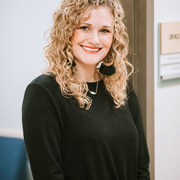
Inspiring Strength and Growth with New Ways to Act
Please use the self-sign-up link and code "Academy2025" to create an account on our CE Portal. If this is your first time accessing our portal, you will receive a confirmation email from ERC and Pathlight Continuing Education Events with a link to log in. If you have an existing account, once you’ve completed the self-sign-up form, you can log directly into your account to access the webinar.
Download our instructional PDF.
Presented by

Leslee Marcom, PhD, CEDS-C (she/her)
There is an emerging emphasis in clinical psychology on developing transdiagnostic models and interventions that apply to a range of disorders. Psychological Flexibility-Based Interventions, the transdiagnostic processes that inform Acceptance and Commitment Therapy, targets processes of change and increase the ability of the individual to behave and respond in ways that help move them into a life of vitality. Acceptance and Commitment Therapy (ACT) contains six core behavioral processes for change that can be utilized by both practitioner and client. This session will highlight how clinicians can use the ACT model and language to synthesize and target psychological flexibility-based interventions in their current practice.
Educational Objectives
Following this presentation, participants will be able to -
- Describe two ways psychological inflexibility contribute to a range of disorders.
- Identify the ACT core processes and barriers that can arise.
- Identify helpful metaphors and techniques that can be utilized in individual and family therapy settings.
